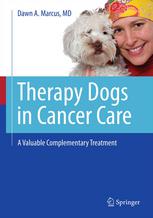

Most ebook files are in PDF format, so you can easily read them using various software such as Foxit Reader or directly on the Google Chrome browser.
Some ebook files are released by publishers in other formats such as .awz, .mobi, .epub, .fb2, etc. You may need to install specific software to read these formats on mobile/PC, such as Calibre.
Please read the tutorial at this link: https://ebookbell.com/faq
We offer FREE conversion to the popular formats you request; however, this may take some time. Therefore, right after payment, please email us, and we will try to provide the service as quickly as possible.
For some exceptional file formats or broken links (if any), please refrain from opening any disputes. Instead, email us first, and we will try to assist within a maximum of 6 hours.
EbookBell Team

5.0
78 reviewsDogs that visit patients with cancer have been convincingly shown to reduce stress, loneliness, and mood disturbance that may complicate cancer care. In addition, dogs may provide important motivation for patients to maintain rehabilitation programs that have been shown to reduce cancer risk and improve cancer survival. Outlining all of these issues and many more, Therapy Dogs in Cancer Care: A Valuable Complementary Treatment is a ground-breaking, highly innovative addition to the literature on cancer care. Detailing a comprehensive summary of truly impressive research demonstrating the ability of dogs to serve an important therapeutic role within the cancer arena and in other serious medical conditions, the text provides highly practical advice and very helpful “tips” to ensure that those who wish to employ dogs to assist the cancer patient have the necessary knowledge and “tools” to optimize outcomes. Authored by Dawn A. Marcus, MD, an expert in both pain management and health improvement through human and dog interaction, Therapy Dogs in Cancer Care: A Valuable Complementary Treatment is an extremely well-organized, well-researched, and highly readable book. Providing practical suggestions to effectively incorporate dogs into cancer care, with detailed instructions about requirements for therapy dogs to ensure visits are safe and limit unwanted spread of infection, Therapy Dogs in Cancer Care: A Valuable Complementary Treatment is an invaluable reference that will inform and delight both the clinician desiring a “how-to” text as well as the casual reader.